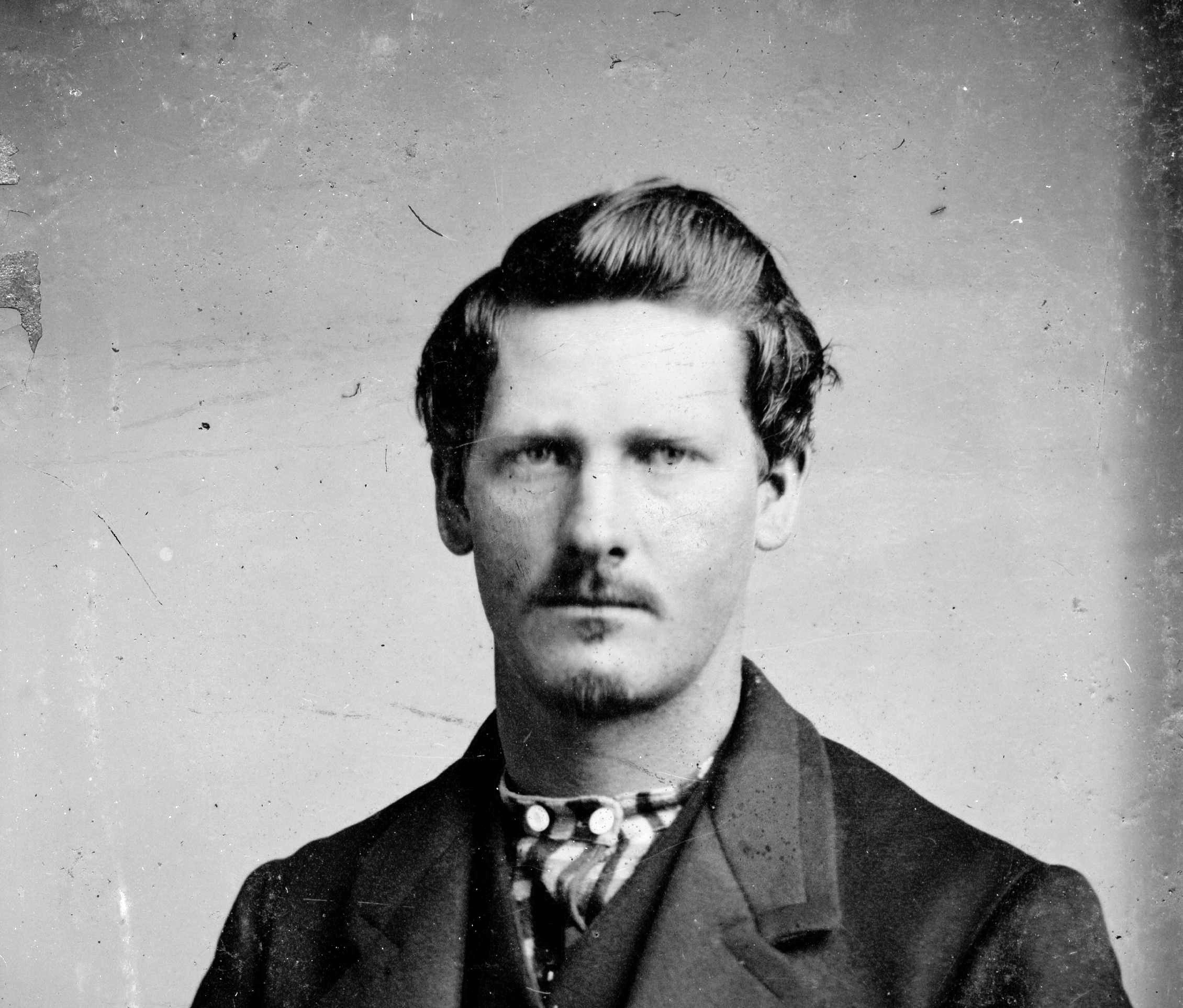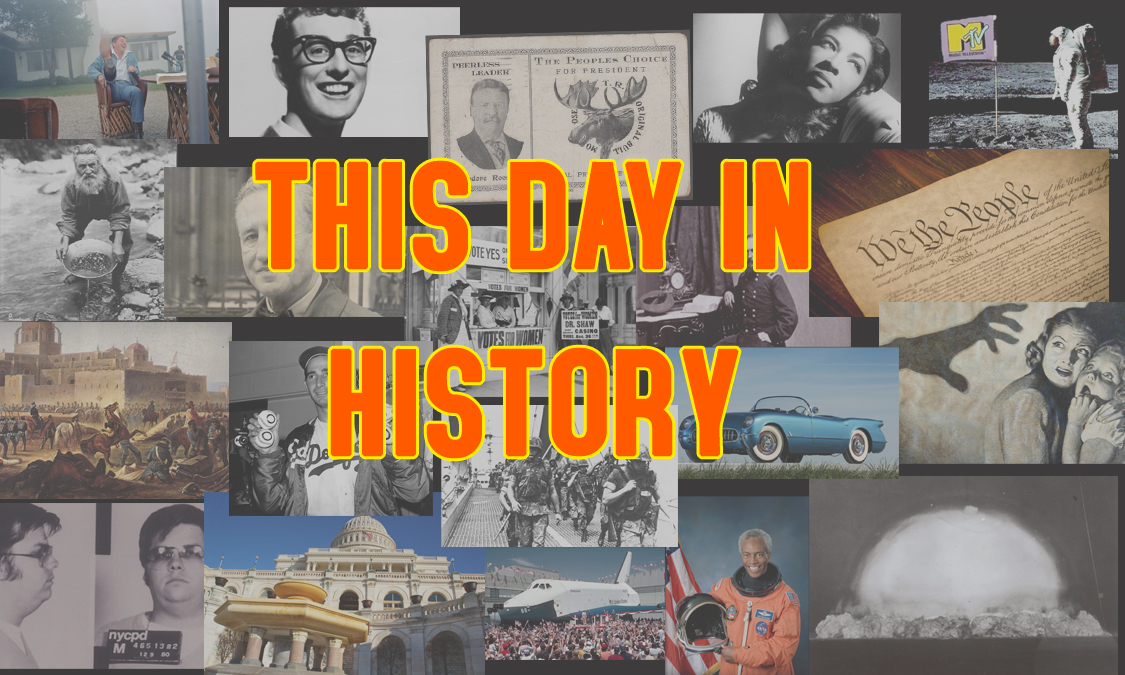This Day In History
Wyatt Earp dropped from Wichita police force

Born in 1848, Wyatt was one of the five Earp brothers, some of whom became famous for their participation in the shootout at the O.K. Corral in 1881. Before moving to Tombstone in 1879, however, Wyatt had already become a controversial figure. For much of his life, he worked in law enforcement, but his own allegiance to the rule of law was conditional at best.
In 1870, residents of Lamar, Missouri, elected Wyatt town constable. He did a good job as constable, but within a year his wife died of typhoid and he began wandering about the West. Not long after, Wyatt was arrested for stealing horses in Indian Territory, and he fled to Kansas to escape prosecution.
In 1873, Wyatt joined his older brother James in Wichita, Kansas, the rowdy cattle town that was the northern terminus of the Chisholm Trail. Wyatt again pinned on a badge. At first, it appears that he worked for a private security force employed by local saloons and businesses to keep order, but Wichita Marshal Michael Meagher hired him as an official city policeman by 1875.
Wyatt soon proved to be a daunting police officer. He knew how to use his Remington pistol, and he kept his skills sharp with frequent sessions of target practice. However, Wyatt also liked the Remington because it had a strap that made it an effective club: whenever possible, he preferred to pistol-whip his opponents rather than shoot them. He was also a formidable fistfighter. His friend and fellow law officer, Bat Masterson, later recalled that, “There were few men in the West who could whip Earp in a rough-and-tumble fight.”
During the next year, Wyatt again proved his mettle as a law officer, but his political skills were less refined. In April, Wichita held an election for city marshal. An opponent named William Smith challenged Wyatt’s boss, Michael Meagher, for the office. On April 2, Smith made several disparaging remarks about Meagher, and Wyatt took offense. Wyatt confronted Smith and beat him in a fistfight.
Although Meagher won reelection, he was unable to save Wyatt’s job. On this day in 1876, a Wichita commission decided that Wyatt’s violent behavior was unacceptable and did not rehire him as a police officer. As the town newspaper conceded, “It is but justice to Earp to say he has made an excellent officer,” but the young lawman had to learn to control his passions and play the political game.
After losing his job in Wichita, Wyatt immediately moved to Dodge City, where he found work on the police force. A few years later he joined several of his brothers in the booming mining town of Tombstone, Arizona. Unfortunately, wherever Wyatt traveled, trouble seemed to follow. In 1881, the controversial gun battle at the O.K. Corral again raised questions about Wyatt’s fidelity to the rule of law. Many claimed Wyatt helped kill Billy Clanton and Tom and Frank McLaury at the O.K. Corral not for legitimate law enforcement reasons, but because of a personal feud between the Earp brothers and the Clanton-McLaury clans. Although exonerated by a local Justice of the Peace, Wyatt was soon after involved in several other questionable murders, and he was eventually forced to flee Tombstone.
Wyatt Earp seemed unable to control his passions or play the political game, though his propensity for solving problems with bloodshed waned as he grew older. He spent the next five decades of a long and interesting life wandering around the West, dabbling in mostly unsuccessful business ventures in gold, silver, and oil. He eventually settled in Los Angeles where he died in 1929 at the age of 80.
– History.com Staff
This Day In History
Truman announces development of H-bomb

U.S. President Harry S. Truman publicly announces his decision to support the development of the hydrogen bomb, a weapon theorized to be hundreds of times more powerful than the atomic bombs dropped on Japan during World War II.
Five months earlier, the United States had lost its nuclear supremacy when the Soviet Union successfully detonated an atomic bomb at their test site in Kazakhstan. Then, several weeks after that, British and U.S. intelligence came to the staggering conclusion that German-born Klaus Fuchs, a top-ranking scientist in the U.S. nuclear program, was a spy for the Soviet Union. These two events, and the fact that the Soviets now knew everything that the Americans did about how to build a hydrogen bomb, led Truman to approve massive funding for the superpower race to complete the world’s first “superbomb,” as he described it in his public announcement on January 31.
On November 1, 1952, the United States successfully detonated “Mike,” the world’s first hydrogen bomb, on the Eniwetok Atoll in the Pacific Marshall Islands. The 10.4-megaton thermonuclear device, built upon the Teller-Ulam principles of staged radiation implosion, instantly vaporized an entire island and left behind a crater more than a mile wide. The incredible explosive force of Mike was also apparent from the sheer magnitude of its mushroom cloud–within 90 seconds the mushroom cloud climbed to 57,000 feet and entered the stratosphere. One minute later, it reached 108,000 feet, eventually stabilizing at a ceiling of 120,000 feet. Half an hour after the test, the mushroom stretched 60 miles across, with the base of the head joining the stem at 45,000 feet.
Three years later, on November 22, 1955, the Soviet Union detonated its first hydrogen bomb on the same principle of radiation implosion. Both superpowers were now in possession of the “hell bomb,” as it was known by many Americans, and the world lived under the threat of thermonuclear war for the first time in history.
Source: https://www.history.com/this-day-in-history/truman-announces-development-of-h-bomb
This Day In History
Gandhi assassinated

Mohandas Karamchand Gandhi, the political and spiritual leader of the Indian independence movement, is assassinated in New Delhi by a Hindu extremist.
Born the son of an Indian official in 1869, Gandhi’s Vaishnava mother was deeply religious and early on exposed her son to Jainism, a morally rigorous Indian religion that advocated nonviolence. Gandhi was an unremarkable student but in 1888 was given an opportunity to study law in England. In 1891, he returned to India, but failing to find regular legal work he accepted in 1893 a one-year contract in South Africa.
Settling in Natal, he was subjected to racism and South African laws that restricted the rights of Indian laborers. Gandhi later recalled one such incident, in which he was removed from a first-class railway compartment and thrown off a train, as his moment of truth. From thereon, he decided to fight injustice and defend his rights as an Indian and a man. When his contract expired, he spontaneously decided to remain in South Africa and launched a campaign against legislation that would deprive Indians of the right to vote. He formed the Natal Indian Congress and drew international attention to the plight of Indians in South Africa. In 1906, the Transvaal government sought to further restrict the rights of Indians, and Gandhi organized his first campaign of satyagraha, or mass civil disobedience. After seven years of protest, he negotiated a compromise agreement with the South African government.
In 1914, Gandhi returned to India and lived a life of abstinence and spirituality on the periphery of Indian politics. He supported Britain in the First World War but in 1919 launched a new satyagraha in protest of Britain’s mandatory military draft of Indians. Hundreds of thousands answered his call to protest, and by 1920 he was leader of the Indian movement for independence. He reorganized the Indian National Congress as a political force and launched a massive boycott of British goods, services, and institutions in India. Then, in 1922, he abruptly called off the satyagraha when violence erupted. One month later, he was arrested by the British authorities for sedition, found guilty, and imprisoned.
Source: https://www.history.com/this-day-in-history/gandhi-assassinated
This Day In History
U.S. Baseball Hall of Fame elects first members

On January 29, 1936, the U.S. Baseball Hall of Fame elects its first members in Cooperstown, New York: Ty Cobb, Babe Ruth, Honus Wagner, Christy Matthewson and Walter Johnson.
The Hall of Fame actually had its beginnings in 1935, when plans were made to build a museum devoted to baseball and its 100-year history. A private organization based in Cooperstown called the Clark Foundation thought that establishing the Baseball Hall of Fame in their city would help to reinvigorate the area’s Depression-ravaged economy by attracting tourists. To help sell the idea, the foundation advanced the idea that U.S. Civil War hero Abner Doubleday invented baseball in Cooperstown. The story proved to be phony, but baseball officials, eager to capitalize on the marketing and publicity potential of a museum to honor the game’s greats, gave their support to the project anyway.
In preparation for the dedication of the Hall of Fame in 1939—thought by many to be the centennial of baseball—the Baseball Writers’ Association of America chose the five greatest superstars of the game as the first class to be inducted: Ty Cobb was the most productive hitter in history; Babe Ruth was both an ace pitcher and the greatest home-run hitter to play the game; Honus Wagner was a versatile star shortstop and batting champion; Christy Matthewson had more wins than any pitcher in National League history; and Walter Johnson was considered one of the most powerful pitchers to ever have taken the mound.
Today, with approximately 350,000 visitors per year, the Hall of Fame continues to be the hub of all things baseball.
Source: https://www.history.com/this-day-in-history/u-s-baseball-hall-of-fame-elects-first-members
-

 NEWS1 year ago
NEWS1 year ago2 hurt, 1 jailed after shooting incident north of Nocona
-

 NEWS5 months ago
NEWS5 months agoSuspect indicted, jailed in Tia Hutson murder
-

 NEWS1 year ago
NEWS1 year agoSO investigating possible murder/suicide
-

 NEWS1 year ago
NEWS1 year agoWreck takes the life of BHS teen, 16
-

 NEWS9 months ago
NEWS9 months agoMurder unsolved – 1 year later Tia Hutson’s family angry, frustrated with no arrest
-

 NEWS12 months ago
NEWS12 months agoSheriff’s office called out to infant’s death
-

 NEWS1 year ago
NEWS1 year agoBowie Police face three-hour standoff after possible domestic fight
-

 NEWS1 year ago
NEWS1 year agoDriver stopped by a man running into the street, robbed at knifepoint










